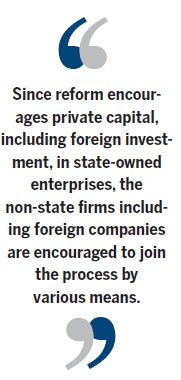Reform holds hope for foreign investors
Updated: 2015-10-02 09:44
By Wu Jiangang(China Daily Europe)
|
|||||||||||
Economic transition is being hobbled by the way SOEs are performing
Many aspects of the reform of state-owned enterprises have been widely discussed in recent years, but what the proposed changes mean to foreign investors has seldom been canvassed.
This issue has yet again become pertinent with the publication last month by the State Council of guidelines on extending such reform. The Third Plenary Session of the 18th CPC Central Committee set mixed ownership as a basic principle of reform in 2013.
The Ministry of Finance says SOEs account for 43 percent of China's total industrial and business profit. However, that impressive performance does not come cheaply.
The SOEs enjoy a lot of favorable treatment, including direct subsidies, concessionary financing, state-backed guarantees, preferential regulatory treatment, and exemptions from antitrust enforcement and bankruptcy rules. In addition, they are the beneficiaries of more than 80 percent of bank loans and have a relatively easy path to being listed on the stock exchange, even as questions about their efficiency swirl around them.
The average return on assets of the 334 central SOEs listed on the Chinese stock market is a meager 2.2 percent, compared with privately listed companies' 5.2 percent and foreign companies' 6 percent. Yet these 334 central SOEs, in a field of 2,780 companies, control more than 80 percent of all the total assets.
SOEs have increasingly found the going tough in trying to pull in revenue and turn a profit in recent years. Their revenue totaled 48.06 trillion yuan ($7.5 trillion) last year, 4 percent higher than the year before, and their total profit was 2.48 trillion yuan, 3.4 percent higher than the year before. Both those figures are far lower than the growth in GDP.

Total revenue between January and July this year was 25.37 trillion yuan, 6.1 percent lower that in the corresponding period last year, and profit in the same period was 1.42 trillion yuan, a fall of 2.3 percent.
As unpalatable as those figures are, they are unfortunately not an aberration.
In fact, with overcapacity, inefficient cost control and slow industrial upgrading, SOEs are hindering the transition that is urgently needed in the ways economic growth is achieved. It is true that reform of SOEs has been going on for many years now, yet at the same time they have continued to grow. This time reform needs to be different.
The new guidelines say reform is aimed at introducing mixed ownership by bringing in private investment. Reform also sets out to improve the competence of SOEs and turn them into fully independent market entities. These measures may finally give more room for other kinds of enterprises to grow.
China has essentially liberalized foreign direct investment, providing channels such as QFII (qualified foreign institutional investor) and RQFII (renminbi qualified foreign institutional investor) schemes, and is constantly simplifying investment procedures, giving foreign companies national treatment. Foreign companies and private companies can share in these opportunities, too.
Since reform encourages private capital, including foreign investment, in state-owned enterprises, the non-state firms including foreign companies are encouraged to join the process by various means, including buying stakes and convertible bonds or through share rights swaps with SOEs.
Because reform divides the SOEs into two categories, for-profit entities and those dedicated to public welfare - the former to be market-based and sticking to commercial operations - the foreign companies may have more opportunities in the for-profit entities. But they can also take advantage of the latter categories in that reform encourages non-state firms to provide public goods and services through public-private partnerships and in other ways.
Since reform will change the way SOEs are managed, with roles more like those of fund managers, boards of directors will have greater decision-making powers, and government agencies will be forbidden from intervening. Thus it will be safer for foreign investors acting as financial investors or strategic investors to play special roles in improving corporate governance.
The new guidelines can be expected to provide opportunities for foreign companies and for them to have a special role in helping China through its economic transition.
The author is a lecturer at the Management School of Shanghai University and a research fellow at China Europe International Business School Lujiazui International Finance Research Center.
(China Daily European Weekly 10/01/2015 page8)
Today's Top News
Russia starts airstrikes against terrorists in Syria
Li: China will meet main goals
Xi celebrates National Day with ethnic representatives
China marks Martyrs' Day at Tian'anmen Square
Ten industries prioritized for upgrading manufacturing ability
Hong Kong tycoon rejects claims about divestment from mainland
Beijing tops China's hourly minimum wage
Obama, Putin meet at UN on Syria, Ukraine
Hot Topics
Lunar probe , China growth forecasts, Emission rules get tougher, China seen through 'colored lens', International board,
Editor's Picks

|

|

|

|

|

|






